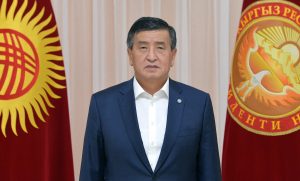In the latest turn of politics in Kyrgyzstan, on October 15 President Sooronbay Jeenbekov tendered his resignation. On October 16 the parliament will meet to accept the president’s resignation.
Jeenbekov’s resignation comes three years to the day after his election, and 11 days after parliamentary elections triggered protests and then a complete political upheaval.
In statement, Jeenbekov highlighted the continued tensions in Kyrgyzstan and his desire to avoid bloodshed. His approval of parliament’s appointment of Sadyr Japarov as prime minister “did not ease the tensions.”
“Unfortunately, the aggression does not subside; the demand for my immediate resignation continues.”
“The current situation is close to conflict,” Jeenbekov said. “On the one side, there are protesters; on the other law enforcement. Military personnel and law enforcement are required to use weapons to protect the State Residence. In this case blood will be spilled, it is inevitable.”
As Eurasianet repored, anti-Jeenbekov crowds were planning to to march on the president’s residence.
Jeenbekov continued that he did “not want to be known in the history of Kyrgyzstan as a president who spilled blood and shot at his own citizens,” he said. “Therefore, I decided to resign.”
Jeenbekov urged Japarov and other politicians to withdraw their supporters from Bishkek.
“No power is worth the integrity of our country and harmony in society.”
Constitutionally, the president’s powers will next transfer to the speaker of parliament, the newly appointed Kanat Isayev. But Isayev, the leader of the Kyrgyzstan party, is now the new target of cries for resignation. According to 24.kg, Isayev avoided answering whether he would also resign. On October 16 the parliament will meet to accept the president’s resignation and the picture will become more clear as to who, exactly, will become the acting president. If Isayev also steps aside, Japarov is next in line to take up the presidency’s powers.
In less than two weeks, Japarov might go from prison not only to parliament, but the presidency.
It’s an extraordinary turn of events since the October 4 parliamentary election, which opposition parties decried as rigged by pro-government and criminal parties. Importantly, the two parties that together captured nearly 50 percent of the vote in election — allegedly by massive vote-buying — were linked with the president (Birimdik) and the Matraimovs (Mekenim Kyrgyzstan), a wealthy and powerful family at the core of immense corruption allegations laid out in several investigative reports released in 2019 and 2020. The results of the election were swiftly annulled by the Central Election Commission (though that decision could conceivably be overturned), and the body optimistically announced new elections would be held by November 6. It’s unclear if the parties accused of engineering the vote-buying, thereby rigging the election, will be disqualified from running, but that seems unlikely. Equally unclear is if a second parliamentary election will be any cleaner an exercise — not to mention a possible presidential election to follow.
In a remarkable statement on October 13, the U.S. Embassy in Bishkek said, “It is clear that one of the obstacles towards democratic progress [in Kyrgyzstan] is the attempt by organized crime groups to exert influence over politics and elections.”
Though not directly named, presumably that is a reference to the Matraimovs and possibly Japarov, too.
The statement continued: “This was evident with vote-buying during the October 4 elections, violence and intimidation in Ala-Too Square on October 9, and irregularities in the parliament session on October 10.” The October 10 session is where Japarov was nominated as prime minister (that is, after the Dostuk Hotel session on October 6 the night he was busted from jail).
“Citizens and their leaders must continue to fight against the influence of organized crime and corruption in politics,” the U.S. embassy urged. “The ultimate goal must be to uphold the Kyrgyz Constitution and rule of law.”
The current reformation of Kyrgyzstan’s political order, apparently under Japarov, is a far cry from what many of those who protested the election results were aiming for. Kyrgyzstan is now in the middle of three interlocking disasters: a public health crisis due to the coronavirus, an economic collapse as a result of the pandemic, and now a complete political crisis.
How Japarov, a man with little government experience and much of it more than a decade ago, before his life in exile and prison, will run a country in the middle of this mess is unclear. He’s certainly not a leader the international community will be eager to engage (if the U.S. embassy statement is any indication) and what, if any, policy plans he has have not been discussed. He’s decidedly not the leader the protesters who first took to the streets on October 5 were envisioning to lead them out of corrupt governance.
It’s perhaps worth pointing out that as powerful as the Kyrgyz prime minister is, constitutionally, few last longer than a year in the seat. Not counting acting prime ministers, Kyrgyzstan has had 22 prime ministers in 29 years of independence. Some of them — Kurmanbek Bakiyev, Almazbek Atambayev, and Sooronbay Jeenbekov — have gone on to become president. Some have gone on to prison. Some have done both.

































